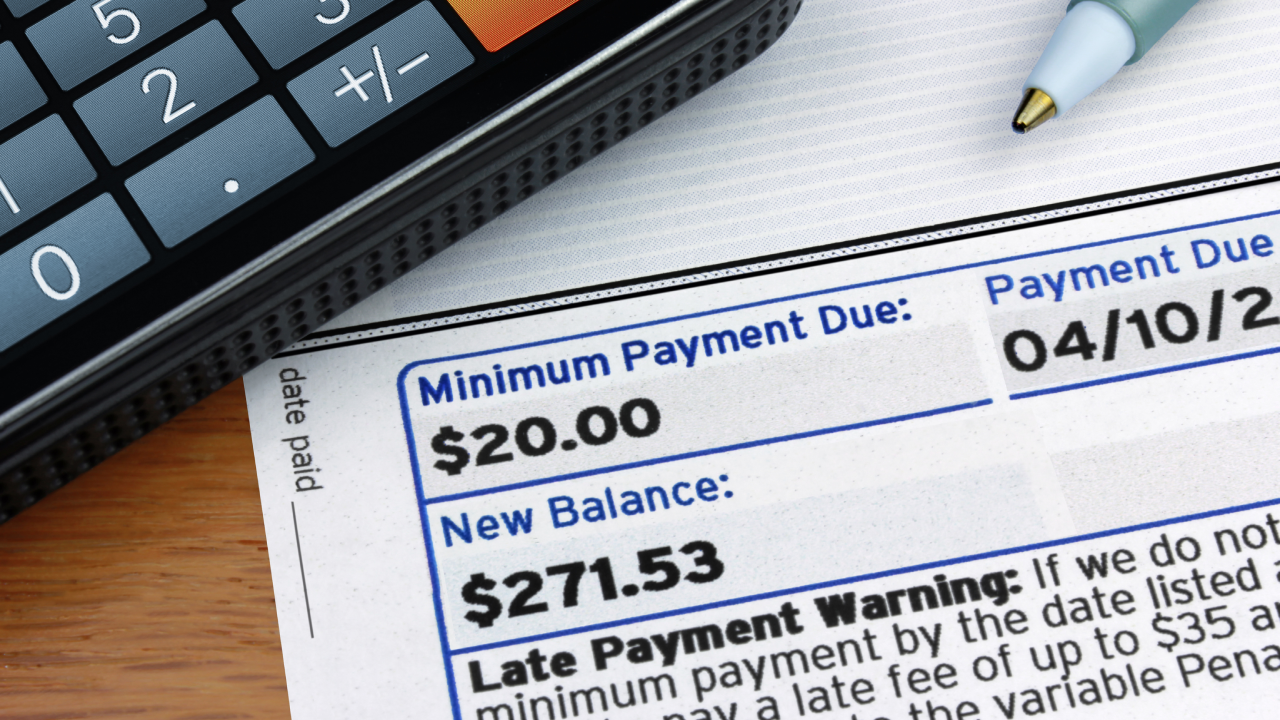5 reasons to pay more than the minimum on your credit card

Key takeaways
- Paying more than the minimum on credit card debt can help you pay down the balance more quickly and pay less toward interest.
- Lowering your credit card balance also decreases your credit utilization ratio, which can have a positive impact on your credit score.
- Reducing your balances with higher payments could help you avoid maxing out your credit card.
When reviewing your credit card bill each month, it’s tempting to go along with the minimum payment — after all, it’s a smaller amount compared to repaying the full balance or putting extra toward your debt. Although the minimum payment is kinder to your budget in the moment, continually paying just the minimum won’t help you in the end.
Take a look at some reasons to pay more than the minimum and strategies for making that happen.
1. Pay off your debt faster
Sticking to minimum payments means it will take longer to pay off your credit card balance, even without making additional purchases. That’s because credit card issuers usually use an average daily balance and compounding interest formula to calculate your interest charges every billing cycle. That means your balance increases every day thanks to interest charges from the day before, and you end up paying interest on interest.
Paying off your balance each billing cycle is the ideal move, but not always achievable. Even if that’s not an option, overshooting the minimum payment, even a little, will help you pay down your credit card balance faster.
Let’s say you have a credit card with a $10,000 balance and an interest rate of 20 percent, right at the current average. Your minimum payment is 2 percent of your balance: $200 on a $10,000 balance. Assuming you continue paying $200 per month even as your minimum payment decreases, it would take over nine years to pay off your balance plus the accrued interest.
| Balance | Monthly Payment | Repayment timeline | Total interest paid |
| $10,000 | $200 | 109 months (9.1 years) | $11,680 |
But what if you could manage to pay $500 per month to your credit card balance? Increasing your payment by an extra $300 drastically cuts your repayment time from over nine years to just over two years. It also drops your total interest paid to $2,266.
| Balance | Monthly Payment | Repayment timeline | Total interest paid |
| $10,000 | $500 | 25 months (2.1 years) | $2,266 |
Credit card issuers are required to include a “minimum payment warning” in compliance with amendments to the Truth in Lending Act. Typically, you’ll find this on the first page of your credit card statement, along with the time it would take to repay your current balance with only minimum payments.
To test this math with your own credit card balances, try using Bankrate’s credit card payoff calculator.
2. Pay less in interest
As demonstrated in our previous example, another benefit to making higher than the minimum payment is less interest. This can add up to significant savings over time and reduce how long it takes to pay off your debt.
Your minimum payment is usually calculated as a percentage of your overall balance. There could also be fees, interest or past due amounts included in the calculation of your minimum payment.
When paying the minimum, a larger portion of the payment goes toward interest charges rather than the principal balance (what you originally spent). By making a larger monthly payment, more money goes toward the principal balance, which is what your interest is calculated on.
Every dollar paid over the minimum reduces your original debt and the interest charged on that debt. So, even if you can’t afford to pay off your full balance, a step in the right direction is committing additional funds to paying down your credit card.
Returning to the example of a $10,000 balance with a 20 percent APR, paying $300 monthly instead of $200 will save you almost $7,000 in interest charges and have you paying off your debt in about four years instead of nine.
If it’s financially possible to pay off your entire balance by the due date, you might enjoy an interest-free grace period on purchases. At the end of a billing cycle, issuers are required to send your billing statement to you so that you get it at least 21 days before the payment due date. If you pay off your entire balance by the payment due date, most issuers will not charge interest on your purchases.
3. Improve your credit utilization ratio
Making more than the required minimum payment on your card is beneficial for your credit utilization ratio — a key factor in determining your credit score. Your credit utilization ratio is a comparison of credit card balances you carry to the next month to your amount of available credit expressed as a percentage.
For example, if you have $40,000 credit limit across all of your cards and carry a $4,000 balance to the next month, your credit utilization ratio is 10 percent.
It’s the second-largest factor contributing to your credit score, accounting for 30 percent of its calculation. Most credit experts suggest keeping credit utilization under 30 percent for a good credit score, but that can be hard to achieve or maintain if you’re only making minimum payments.
It might not seem like an immediate issue, but credit card balances can slowly creep up and become unmanageable without a strategic repayment approach. When you choose to kick in more than the minimum, you free up your available credit, which drops your credit utilization and aids in improving your credit score.
4. Increase your creditworthiness
As you tackle credit utilization by paying more than the minimum, you’ll set off a chain reaction that could culminate in an improved credit score.
As long as you’re spending responsibly or have stopped swiping altogether, consistent extra payments lower your total credit card balance. Once the credit reporting agencies get wind of the lowered balance, your credit utilization ratio lowers too. Since it makes up a significant portion of your credit score, you could see your score improve alongside your debt payoff efforts.
When your credit score rises, you become a more attractive candidate to lenders when applying for new forms of credit like loans, mortgages or another credit card. It may also make borrowing more affordable as higher credit scores qualify for more competitive interest rates.
For example, Experian’s Q3 2024 State of the Automotive Finance Market report shows that borrowers with subprime credit scores had an average auto loan interest rate of 13 percent while borrowers with prime and super prime scores had average rates of 6.70 percent and 5.08 percent, respectively.
5. Reduce the possibility of maxing out your card
If you’re paying the minimum on your credit card each month and still make purchases with it, it’s likely that your balance is inching closer to your credit limit rather than decreasing. Once you max out your credit card, three things happen:
- Your credit score suffers.
- Your minimum payments increase.
- The maxed-out card declines new transactions.
Until you pay down the balance or have the limit increased, a maxed-out credit card disrupts a few aspects of your finances. Making a payment over the minimum helps avoid that outcome by freeing up more of your available balance. It also keeps you in good standing with your credit card issuer by demonstrating responsible credit use.
Strategies for paying more than the minimum on your credit card
Several strategies can help allocate more of your income toward paying down your credit card balance:
- Make more than one payment each month. If increasing your lump sum payment each month seems impossible, consider splitting a larger payment into two (or more) smaller payments. In fact, paying multiple times per month can reduce your overall interest charges because you reduce your average daily balance, which is what most issuers use to calculate your interest charges. Can’t commit to paying $200 all at once? Pay $50 every week instead.
- Stick to a budget. Identify any opportunities to shift your spending to allow for a higher debt payment.
- Cut expenses. Trim unnecessary expenses or negotiate with your creditors to your lower bills as a way to shift funds toward debt.
- Try a new debt-payoff strategy. Use the debt snowball or avalanche method to strategically knock out debt.
- Tap into your savings. It may hurt in the moment, but moving money out of an emergency fund can help you pay down debt more quickly and then rebuild your savings.
- Add to your income. Look to ways that you can generate additional income, such as selling items you no longer need or use, renting out space in your home or cashing in old savings bonds.
While it may take a temporary sacrifice of time, energy or a change in lifestyle, releasing yourself from the constraints of credit card debt is worth it.
Other ways to pay off credit card debt
If you still need some alternative options to pay off debt, consider exploring one of these two methods:
Balance transfer credit cards
These types of credit cards are designed with paying off debt in mind. Most good balance transfer cards come with an introductory 0 percent APR offer, usually 12 to 21 months, which allows cardholders to transfer their balance from another card with high interest to the balance transfer card and pay the debt down interest-free.
However, if you don’t pay off the whole balance by the time the 0 percent APR offer ends, you’ll be stuck paying that high interest again.
To learn more, read our complete guide on balance transfers.
Debt consolidation loans
Debt consolidation is a process that combines all your credit card balances into one loan, often with a lower interest rate. This loan is then paid off with fixed monthly payments, allowing you to streamline your repayment process all into one place.
To learn more, read one Bankrate editor’s success story with consolidation loans.
Learn more: Manage your debt with Bankrate’s debt relief and consolidation resources and tools.
The bottom line
You’re saving yourself time, money and hassle when you make payments above the minimum payment amount required on your credit card, even if the increase in payments stings initially. By paying extra toward your credit card balances, you’ll reduce the amount of interest paid on the borrowed amount and pay off your debt sooner. As an added bonus, you’ll likely see your credit score improve, and you’ll have more available credit at your disposal.
Even increasing your minimum payment by a small amount can significantly reduce the time it takes to pay off your balance and save substantial money on interest. Using one or multiple of the recommended debt repayment strategies could further accelerate your credit card pay-off efforts by helping you allocate more of your income to repayments.
Why we ask for feedback Your feedback helps us improve our content and services. It takes less than a minute to complete.
Your responses are anonymous and will only be used for improving our website.









